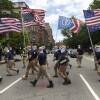Updated May 16 at 2:49 p.m.
Local leaders and Jewish advocates gathered at TD Garden Monday to address the alarming rise in antisemitic incidents in Boston and nationwide. The event, hosted by the Combined Jewish Philanthropies, launched the group’s ‘Face Jewish Hate’ campaign in collaboration with the Foundation to Combat Antisemitism.
Robert Kraft, the 81-year-old founder of the foundation and owner of the New England Patriots, told the crowd that the America he sees today reflects Germany in the late 1930s.
“We’re seeing neo-Nazis raising swastikas and demonstrating, saying ‘Sieg Heil’ and ‘down with the Jews,’” Kraft said. “This is the United States of America in 2023. There’s no room for that kind of hate — or hate of any kind.”
The campaign features a five-point plan: Face Jewish hate, empower the community, build allyship, inform and educate the next generation and strengthen communal security. Those steps were determined by a task force of community leaders and experts on combating antisemitism with antisemitic incidents on the rise.
According to the Anti-Defamation League, there were over 3,600 reported antisemitic incidents across the country in 2022 — the highest number on record since the ADL began tracking the incidents more than 40 years ago. In Massachusetts, antisemitic incidents jumped 41% from 2021 to 2022.
Along with top elected officials like Gov. Maura Healey, Boston Mayor Michelle Wu and Attorney General Andrea Campbell, local Jewish leaders like Kraft addressed the crowd. Speakers stood in front of screens that shared stories of local antisemitic hate crimes, like that of Rabbi Shlomo Noginski, who was stabbed eight times last summer in Brighton outside of a Jewish school. Noginski attended the event but did not address the crowd.
Dr. Jeremy Schiller, who, during his tenure as the Chair of the Salem Board of Health during the COVID-19 pandemic, received several antisemitic messages and threats from people who opposed vaccination and mitigation efforts.
He said that, on top of his outrage and indignation, he also felt a growing sense of loneliness and isolation from the lack of attention to antisemitic hate during the pandemic.
“If [antisemitism] is not called out, if our communities stay silent, then we enter into that same dangerous debate,” he said. “That’s sending me a yellow star or depicting me with a noose around my neck to my kids, or equating COVID mitigation measures ... to Nuremberg laws.”
Members of other faiths also spoke on the resurgence of antisemitism locally and nationally. Cardinal Sean Patrick O’Malley, who serves as archbishop of the Archdiocese of Boston, said he was stunned to hear Jewish leaders’ testimony at a joint Catholic and Jewish community event about the measures Jewish folks must take to practice their faith safely.
“I was horrified to hear about how they have to have their services with doors locked in all kinds of security and cameras and armed guards,” he said. “Racism and antisemitism have always been the original sins of our country, and we must never let our guard down.”
Correction: This story was updated to correct the misspelling of Rabbi Shlomo Noginski's name.








